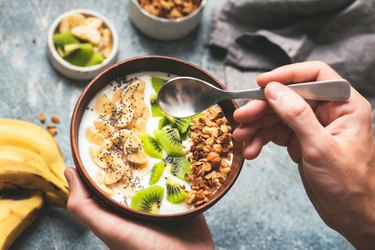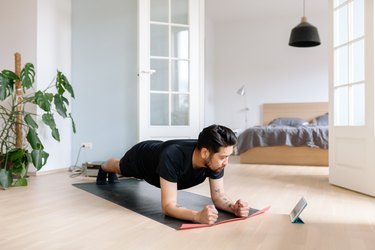
Constipation is super common (at least 2.5 million Americans see their doctor about it every year, according to the Cleveland Clinic) and plenty of things can cause your digestive tract to go in slow-mo.
"Almost universally, everyone will deal with constipation at some point," Michael Papper, MD, gastroenterologist at Florida Digestive Health Specialists, tells LIVESTRONG.com. And that includes the very GI doctors we turn to when we're feeling backed up.
Video of the Day
Video of the Day
There are many ways to combat constipation, ranging from dietary maneuvers to supplements to timing your bathroom trips just so — so how do gastroenterologists personally get the job done? Read on to find out.
1. 'Maximize Your Bathroom Set-Up'
For Dr. Papper, decreasing constipation starts with using your body's physiology to maximize effective number-two sessions.
"During the act of having a bowel movement, there's a muscle called the puborectalis that relaxes to straighten out the rectum, allowing a direct pathway for stool to pass," Dr. Papper says. "Unfortunately, most toilets are designed so the user sits in a position that doesn't maximize the effectiveness of this action."
Using a platform, such as a stepping stool, or bringing the knees closer to the chest during bowel movements "causes maximal straightening of the rectum, allowing stool to pass more efficiently and reduce straining," Dr. Papper says.
Related Reading
2. 'Take Advantage of the After-Meal Urge'
Another of Dr. Papper's favorite tricks is taking advantage of the gastrocolic reflex post-meal.
"After you eat, the stomach stretches in response to a meal and sends a message to the colon that a meal has been ingested," Dr. Papper says. "This increases the colonic muscle contractions to help remove waste."
The reflex is typically stronger with bigger meals and sometimes overactive in people with irritable bowel syndrome. "By trying to have a bowel movement shortly after having your largest meal of the day, you can use the gastrocolic reflex to help move things along," Dr. Papper says.
3. 'Eat More Fiber'
"When constipation strikes, I try to eat more fiber and drink a ton of water," Rajiv Sharma, MD, Indiana-based integrative gastroenterologist, tells LIVESTRONG.com. "Both methods work thanks to the osmotic method, which encourages more water to enter the colon." The result? Bulkier stool that's softer and much easier to pass.
Because adding more fiber to your diet too quickly can cause abdominal discomfort, like gas and bloating, gradually increase your intake — say, one additional serving per week — and let your body adjust before adding another (making sure to increase your water intake as you go so you can successfully, well, go).
Related Reading
4. 'Use MiraLAX'
If more fiber helps but doesn't entirely do the trick, Dr. Sharma turns to MiraLAX to help get things moving. MiraLAX is an osmotic laxative, per Harvard Health Publishing, which means it helps soften stool and increase bowel movements.
Just be sure to follow the directions on the bottle, and keep in mind that side effects can include gas, bloating and nausea.
5. 'Carry Water With You When You're On-the-Go'

Between the prolonged sitting, change in diet and jet lag, constipation when traveling (especially when you're flying on planes for long distances) is a common scenario for many people.
As one of her preventative tactics, "I carry a bottle filled with water when traveling and it serves as a prompt and designated target amount to drink," Samantha Nazareth, MD, a New York-based board-certified gastroenterologist, tells LIVESTRONG.com. "Don't let the only time you drink water occur when the flight attendant offers you a small cup."
The longer food stays in your bowel, the more your poop dries out and becomes harder to pass — so not only can staying on top of your H2O intake combat the lack of humidity on the plane, but it can keep your sluggish insides hydrated and literally good to go.
5. 'Eat More Kiwifruit'
Besides stepping up her fiber and water intake, Sapna Makhija, MD, gastroenterologist and co-founder of GI Health Center in Burlington, Ontario, Canada, stops constipation in its tracks by eating more kiwifruit.
"A small study [of 11 people] published in May 2020 suggests that eating two green kiwifruits per day can be helpful in managing constipation," Dr. Makhija says. (That study appeared in Neurogastroenterology & Motility.)
According to the research done so far, it seems the soluble and insoluble fibers that kiwi contains both soften stool and speed up the pace at which food travels through the digestive tract — all without the gas and bloating that typically comes with upping your fiber intake.
If you're not a fan of kiwi, "prunes are well-known to help with constipation," Dr. Makhija says. Not only are they high in fiber, but they also contain sorbitol, a sugar alcohol that acts as a natural laxative. Ditto berries, apples, avocados, cherries and peaches.
6. 'Keep Fiber Gummies on Standby'
For occasional bouts of constipation, Bryan Curtin, MD, director of neurogastroenterology and motility at Mercy Medical Center in Baltimore, Maryland, makes sure he has convenient fiber supplements on standby.
"I'll take some fiber gummies along with me when I travel for a prolonged period of time," Dr. Curtin says. "They help add bulk to stool and the colon retain water, which then assists with constipation by making stool easier to pass."
When on the hunt for quality fiber supplements, Dr. Curtin recommends finding gummies that are predominantly fiber, as this will help the most with constipation.
"There are a lot of other products that will pack the gummies with other substances, such as inulin, prebiotics and probiotics, which sound more impressive, but there's much less data to support their use," Dr. Curtin says.
Try These
Nature Made Adult Fiber Gummies (Amazon.com; Price: $27.18)
7. 'Eat Softer, Mushier Foods'
When Dr. Nazareth is on the go and wants to keep her digestive tract on the same page, she briefly changes her diet to primarily soft, mushy foods, like smoothies and soups.
"This type of consistency doesn't require a lot of work by the GI tract to digest," she says. "It's like giving your gut a break to catch up without skimping on nutrients."
8. 'Get Moving'
Exercise in any form (yoga, cardio, brisk walking) is one of the top antidotes when your insides are feeling sluggish, and is another of Dr. Nazareth's go-to strategies: "It stimulates gut muscle contractions and gets the digestion wheels moving, from mouth to anus."
- American College of Gastroenterology: "Constipation and Defecation Problems"
- Beth Israel Deaconess Medical Center: "Constipation and the Pelvic Floor Muscles"
- Cleveland Clinic: "Constipation"
- Food Insight: "What is Sorbitol?"
- Mayo Clinic: "Dietary fiber: Essential for a healthy diet"
- Mayo Clinic: "Jet lag disorder"
- StatPearls Publishing: "Physiology, Gastrocolic Reflex"
- Harvard Health Publishing: "Don't Bomb the Bowel With Laxatives"
Is this an emergency? If you are experiencing serious medical symptoms, please see the National Library of Medicine’s list of signs you need emergency medical attention or call 911.


